Today, we look at one of the more interesting of the kiddie video game book publishers - Kid Stuff Records, which produced a number of video game-themed book and record sets (and albums) in the 1980s.
If you are over 30, you probably remember listening to "read-along" book-and-record sets as a kid. These consisted of a short book along with a record (later a cassette tape) that you could play while reading it ("SEE the pictures, HEAR the story, READ the book").
The record contained a reading/dramatization of the text , along with sound effects (including the standard "turn the page now" sound).
A number of companies produced them, including Disneyland Records (the market leader):
and, my personal favorite, Power Records (a sub-label of Peter Pan)
(Note check out powerrecord.blogspot.com for more info on Power Records).
Kid Stuff, a dba name for I.J.E. Distributing, was formed in Hollywood, Florida in 1977 by former Disneyland Records employees Jerry Weiner and Irv Schwartz, producing titles like The Story of Jack & the Beanstalk and Mostly Ghostly. The idea was to produce cheap records for kids. Kid Stuff also produced records that went a bit beyond the standard sugary-sweet fairy tales and other stories typical of children's records of the time with titles like Songs From Saturday Night Fever and Sergeant Pepper's Lonely Hearts Club Band.
The company really started to grow (at least according to a 1982 Cleveland Plain Dealer article) when they hired Sheldon Tirk as VP of sales. A graduate of Ohio State, Tirk had been in the record business for 20 years, and had served as national sales manager for Smash Records, where he had four #1 hit records with Jerry Lee Lewis.
Shortly after arriving at Kid Stuff, Tirk contacted American Greetings about the possibility of licensing its Holly Hobby greeting card character. Instead, American Greetings suggested Tirk license a new character they were about to introduce called Strawberry Shortcake. Tirk made the deal and it proved to be a bonanza or Kid Stuff, who followed with licensing deals for Fat Albert, the Pink Panther, Raggedy Ann and Andy, Flash Gordon, and Looney Tunes.
By 1982, Kid Stuff was the second largest manufacturer of children's records and tapes (behind 800-pound gorilla Disney).
Starting in 1982, Kid Stuff began producing a series of video game themed books and records. That isn't unusual, given the popularity of video games at the time. Nor was it unusual that they struck a deal with Atari. What WAS unusual, however, was the four (at least) Atari titles that they picked: Asteroids, Missile Command, Super Breakout, and Yars' Revenge. While three of these were coin-op titles, the cover art on the records was from the Atari 2600 versions.
Let's take a look at the titles:
The Story of Asteroids
I don't have a link to the full record for this one, but
this guy made a cool movie based on an abridged version of it here: http://www.youtube.com/watch?v=uKcJYBgzsB8
I will also put the full text at the end of the post.
Kid Stuff offered two main types of video game products. The
first was the book-and-record sets, that usually included a 7" record
(while it had a center hole that was the size of a 45, it was actually 33 1/3
RPM). The second was an LP (with no book) that included stories and music. They
often made both for a given title. Such was the case with Asteroids. We'll start with the book and record.
If you were wondering how you could make a narrative
story out of Asteroids, join the
club. As you will see below, the rather thin plot involves Captain John Strohmeyer
of the "Outer Contact Recon Patrol", who is on his way to
investigate an emergency transmission from an unmanned robot ore-carrier that
was on its way from "United Federated Mining Operation 6" when it
disappeared. I'll let you read the book for the rest of the story. I have to
admit that it is far from a great story (though it was written for kids). It
has one of the hallmarks of bad science fiction - the overuse of pointless technical
jargon. You know, like one of those books where everyone brushes their teeth
with their "laser toothbrush" and eats "astro pancakes" for
breakfast. Examples here abound: "ion rocket engines", "gas
decay boosters", "binary hybrid computers", "magnetic bubble memories". As is
typical of such stories, they also misuse the jargon on occasion. At one point we're
told that the computer Cynthia "…went haywire…90 light days into the
mission."
Despite its shortcomings, however, I can't help but love this thing. It stands as one of the strangest now-forgotten relics of the golden age of video games.
Despite its shortcomings, however, I can't help but love this thing. It stands as one of the strangest now-forgotten relics of the golden age of video games.
Asteroids
Full audio here: https://www.youtube.com/watch?v=zPQaSLoznB0
In a response to the post, someone who claims to be Braden's sister claims that the Kid Stuff John Braden was born in 1946 in North Carolina and died in New York City in 1987 (the Magnum PI John Braden was born in 1949 and died in 2004). He had nine gold records with Kid Stuff and worked on "dozens" of musicals. J. Waxman is apparently arranger Jeff Waxman. Braden (if it is the same Braden as the Kid Stuff one) released an eponymous album in 1968 on A&M records. Ry Cooder played guitar on a few of the tracks, as did Chris Ethridge and Sneaky Pete of Flying Burrito Brothers, Richard Bell (keyboardist for Janis Joplin and The Band), and folk musician Bruce Langhorne.
This one has a different story than the book-and-record
(though they both involve battling asteroids). The album starts with the
"Atari Theme" - a rather dull, stately instrumental that includes
annoying laser sounds that seem like something from a bad disco record. Then
comes part one of the story. This time the star is Captain Jim Stanton who,
along with his new rookie co-pilot Chip Brain, finds himself transported 600
years into the past to the year 1983, where Earth is threatened by a massive
asteroid. This one is more of a dramatization than a reading and has multiple characters.
Once again, it features the techno jargon (Stanton's sister Zora 237 lives in
Pan Asia - "After one week on
earth, I'm as nervous as a Protolean android in a jump suit. I hear they
cleaned up the place a lot after the industrial techno-freeze…" - shades
of Spock being ".. more tight-lipped than an Aldeberan shellmouth"
here). And, once again, there are errors ("silicone chips").
The story is interrupted by two songs. First is "Asteroids",
featuring the chorus
Asteroids… Asteroids
Photon torpedoes ready
Shields up, hold 'em steady
Asteroids…Asteroids …got one!! …Asteroids
Photon torpedoes ready
Shields up, hold 'em steady
Asteroids…Asteroids …got one!! …Asteroids
Next is "Time Warp", a vocoder techno tune with
robotic vocals. Then comes the conclusion of the story (Does Jim save the day?
What do YOU think?) followed by a reprise of the Atari Theme..
The record (like almost all, if not all, the Kid Stuff
video game records) was produced by John Braden. The songs are credited to John
Braden and "J. Waxman".
So who is John Braden? One possibility is that he was the
same John Braden who was a writer, producer, and director on shows like Magnum PI and Knight Rider and who provided the voice of Senator Woden in the Max Payne video game series.
According to a post here, however, the Kid Stuff John
Braden was a different person..
In a response to the post, someone who claims to be Braden's sister claims that the Kid Stuff John Braden was born in 1946 in North Carolina and died in New York City in 1987 (the Magnum PI John Braden was born in 1949 and died in 2004). He had nine gold records with Kid Stuff and worked on "dozens" of musicals. J. Waxman is apparently arranger Jeff Waxman. Braden (if it is the same Braden as the Kid Stuff one) released an eponymous album in 1968 on A&M records. Ry Cooder played guitar on a few of the tracks, as did Chris Ethridge and Sneaky Pete of Flying Burrito Brothers, Richard Bell (keyboardist for Janis Joplin and The Band), and folk musician Bruce Langhorne.
The Story
of Missile Command
Full audio here: http://www.retrogamingroundup.com/storybooks/missilecommand/
You can also download it from the Computer Museum here:http://www.pcmuseum.ca/details.asp?id=39639&type=Memorabilia
But I wasn't able to get it to work.
This one is very similar to its Asteroids counterpart. Like Asteroids, the story here is is a bit boring and involves First Office Ed Matthews attempt to defend the planet Zardon from an attack by the Krytolians. I'll spare you the details this time (you can listen to the audio if you're interested)
Missile Command
Story Audio (no songs): https://www.youtube.com/watch?v=jLdqmsdrm78
Once again, the record features a more in-depth story with different characters (and much more background on the Krytolians). There are also two songs (in addition to the Atari Theme): Missile Command and Zardon Commanders. The Story of Yars' Revenge
Yars' Revenge
Full Audio: https://www.youtube.com/watch?v=TYHZKPc0z30
I couldn't find a copy or audio for the book and record but did find audio for the LP.
The story on the LP is a recruiting talk to a young Yar warrior as he prepares to defend his insectoid race from invasion and exact "Yars' Revenge". It includes a history of the Yars, instructions on how to defend the Yars, and a tearful goodbye from Father and Mother Yar. The songs this time are Yars' Revenge (another techno track that I actually sort of like - but only sort of) and Fly Yar Warriors (plus the now unbearably annoying Atari Theme for a fifth and sixth time).
According to the comments on the youtube video, the narrator here was none other than Peter Fernandez, voice of Speed Racer, who also did voices for a handful of Power Records titles (he was Peter Parker/Spider Man on Spider Man: Mark of the Man Beast).
Shockingly, given his other work, Yars' Revenge must have been highly regarded by some, since it was read at a 2010 memorial to Fernandez that aired on the program Destinies on WUSB, student radio station at the University of New York:
http://captphilonline.com/Destinies_2010.html
Not all of Kid Stuff's video game records were for Atari games.
Next time, we'll take a look at their other efforts: Donkey Kong and the Pac-Man series (which included at least 9 different titles).
In the meantime, here's the full text of The Story of Asteroids (sorry for the poor scans)


.png)











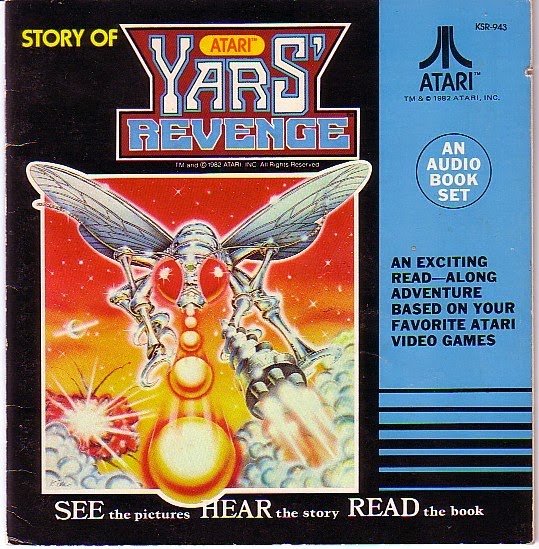




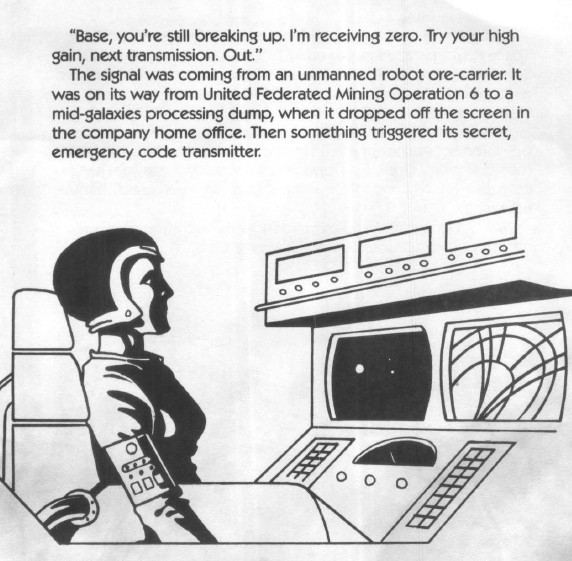




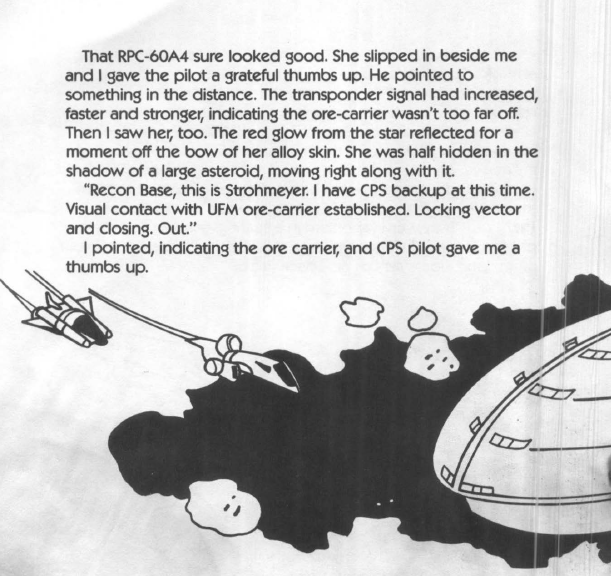
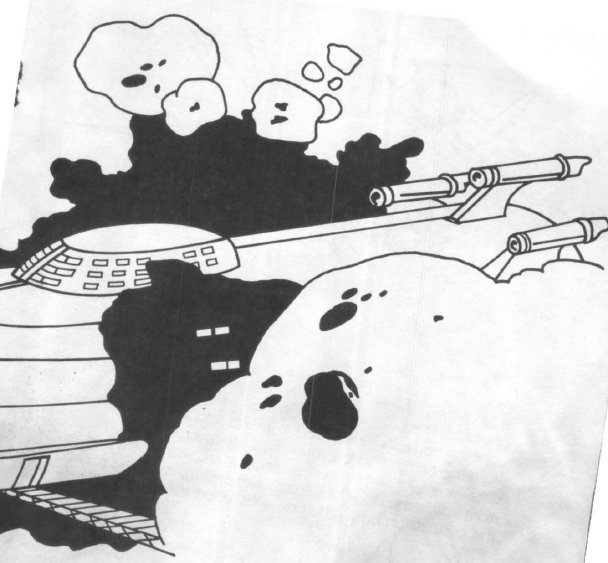

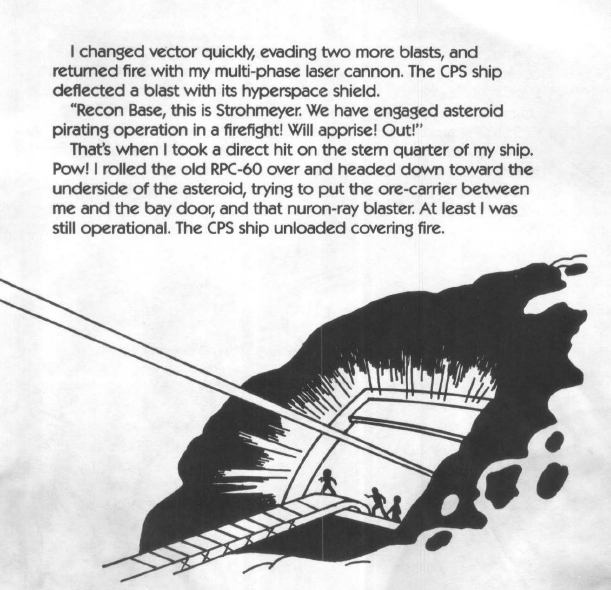





No comments:
Post a Comment